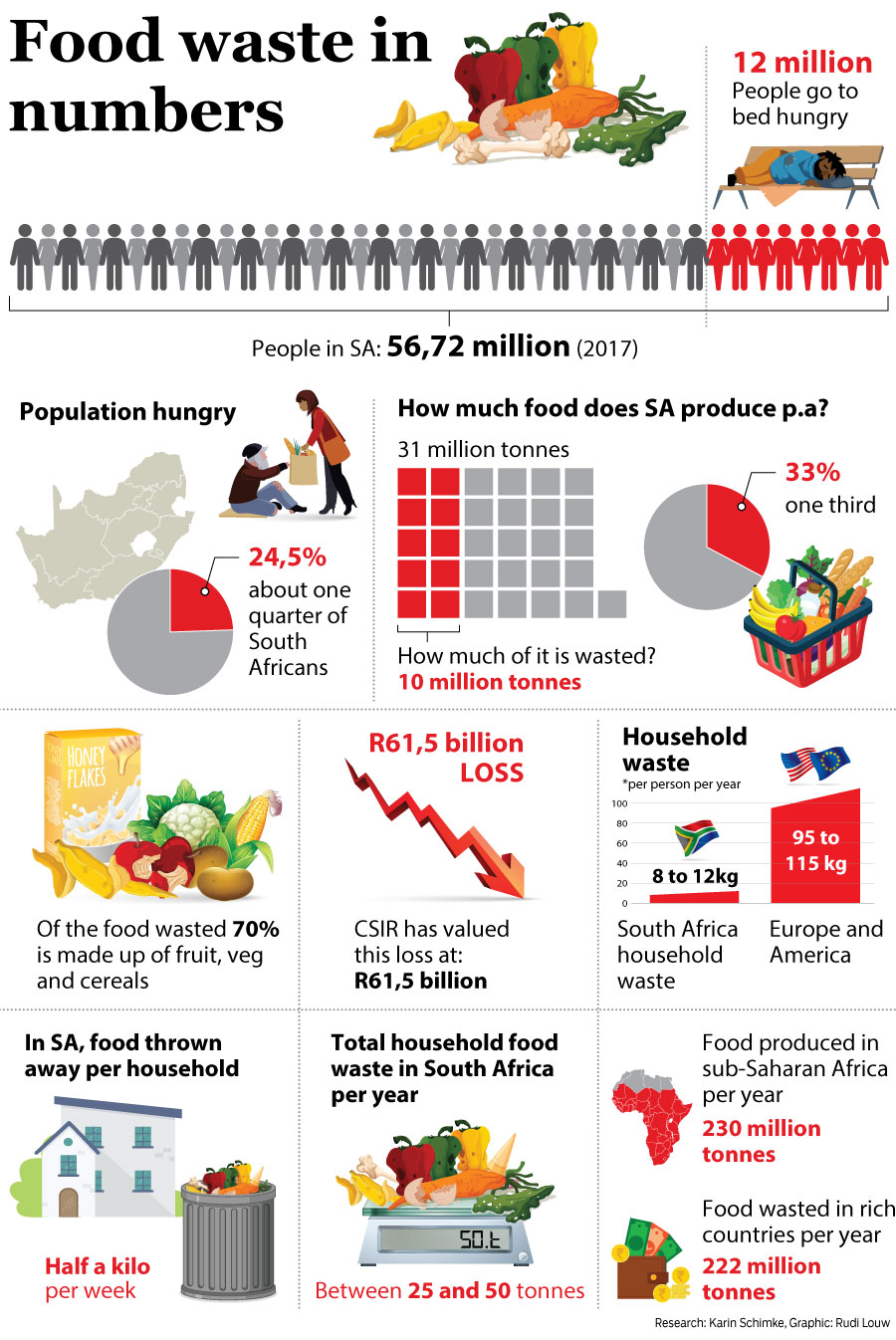 In global terms, the news appears to be good: South Africans waste much less food than the worst offenders (who chuck away between 95 and 115kg of food each every year), but a little more than people from the rest of sub-Saharan Africa and from South and South East Asia (who throw out between six and eleven kilos each every year).
In global terms, the news appears to be good: South Africans waste much less food than the worst offenders (who chuck away between 95 and 115kg of food each every year), but a little more than people from the rest of sub-Saharan Africa and from South and South East Asia (who throw out between six and eleven kilos each every year).
In June 2018, the South African Journal of Science (SAJS) published a study that cast some light on consumer food waste habits in South Africa, a neglected area of enquiry in developing countries. These figures are from that study which extrapolated from figures collected in Gauteng, the province that contributes about 45% of the total municipal waste generated in South Africa.
Comparisons are illustrative and have been shown to be helpful in changing behaviour, so these facts may or may not spur some of us on to change our habits around buying, cooking and storing food so that we can reduce waste. But it doesn’t change the fact that there is food that is produced that never gets eaten. It is estimated that between a third and a half of all the food produced all over the world every year is never consumed.
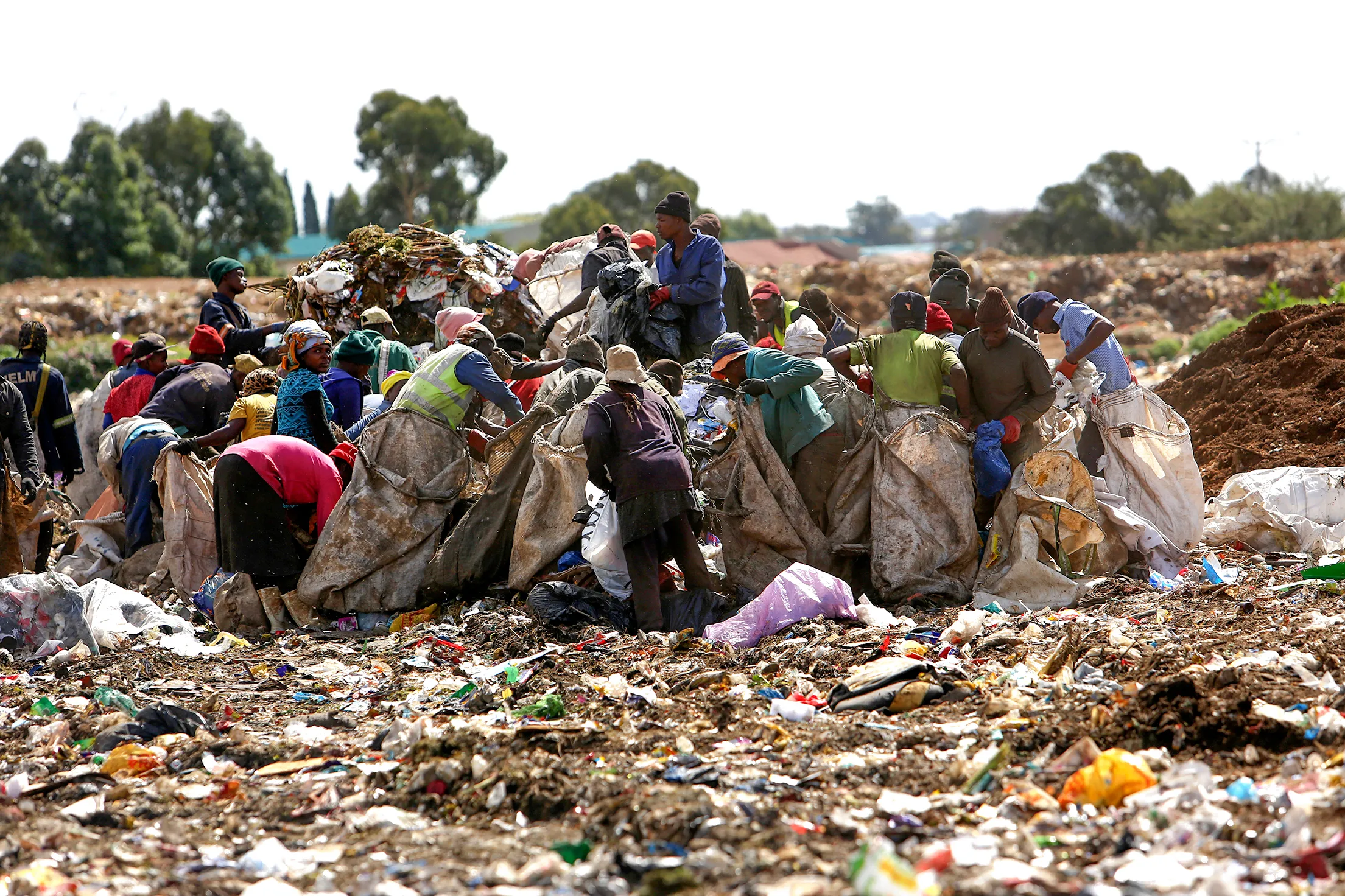
People are seen picking waste at Rietfontein Landfill site. Two people were killed two weeks ago at the Rietfontein Landfill site in KwaThema, Springs, in what is believed to be gang war over trash collection territory. (Photo: Alon Skuy/Gallo Images/Sowetan)
“It is ethically unacceptable to waste food that could be used to feed people,” write Suzan Oelofse, Aubrey Muswema and Fhumulani Ramukhwatho in their SAJS article “Household food waste disposal in South Africa”.
“In South Africa, 12 million people (24.5% of the national population) go to bed hungry each day and it is reported that South Africa has the largest proportion of food wastage in Africa.”
Food wastage is a three-pronged spear of which the loss of nutrition to the hungry represents only one prong. The other two are the waste of resources used in producing the food and the extra carbon dioxide that gets pumped into the atmosphere from the food rotting in landfills.
Science and Our Burning Planet writer Leonie Joubert, author of The Hungry Season: Feeding Southern Africa’s Cities, writes: “(T)he nutrients in the soil used to grow that calorie are wasted, the water to grow the crops, the oil used to plough or fertilise the land, more diesel used to harvest the crop, energy spent on processing or shipping the food, and the ever-shrinking atmospheric space used to soak up all the greenhouse gas emissions.”
One of the consequences of all this waste is that the price of food goes up.
“The cost of producing, shopping, storing and packaging every wasted calorie has to be absorbed somewhere else in the food value chain which ultimately drives up the cost of food itself,” Joubert notes.
The annual household cost of food waste in South Africa is R21.7-billion.
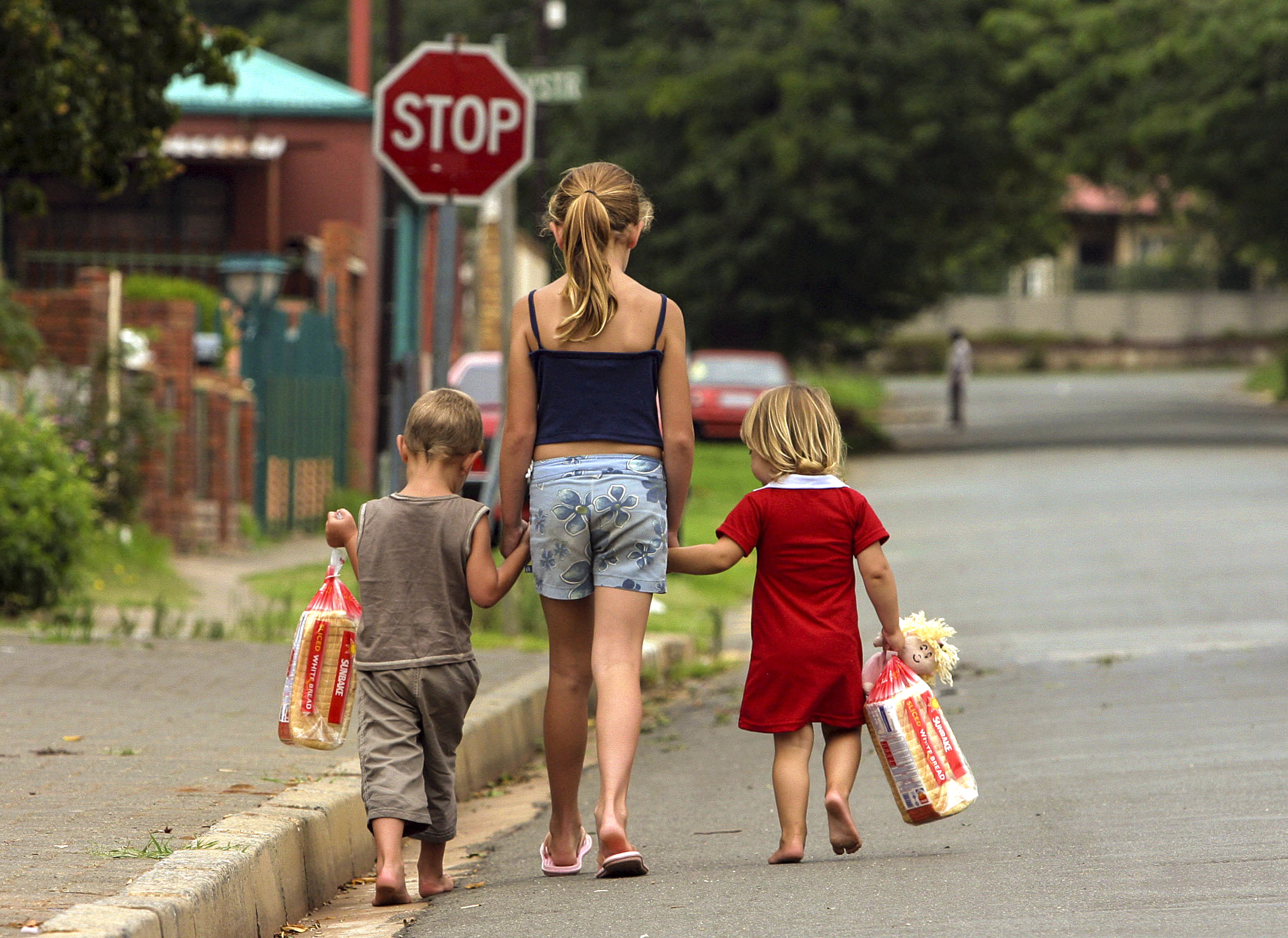
Children in Vrededorp, Johannesburg walk home from a soup kitchen which receives expired food from supermarkets.(Photo Joyrene Kramer)
“Preventing food wastage will not only save money for households,” say Oelofse, Muswema and Ramukhwatho, “but will have broader economic, social and environmental benefits. Reducing food waste will address food and water security concerns and contribute to the development of more sustainable food systems.”
While “all households, irrespective of income level, contribute to food waste”, according to the food disposal article in the SAJS, there is a direct relationship between household food waste generation, household income, and the number of people residing in a household.
“Food waste decreases when there are more occupants, yet increases with household income level,” the article states.
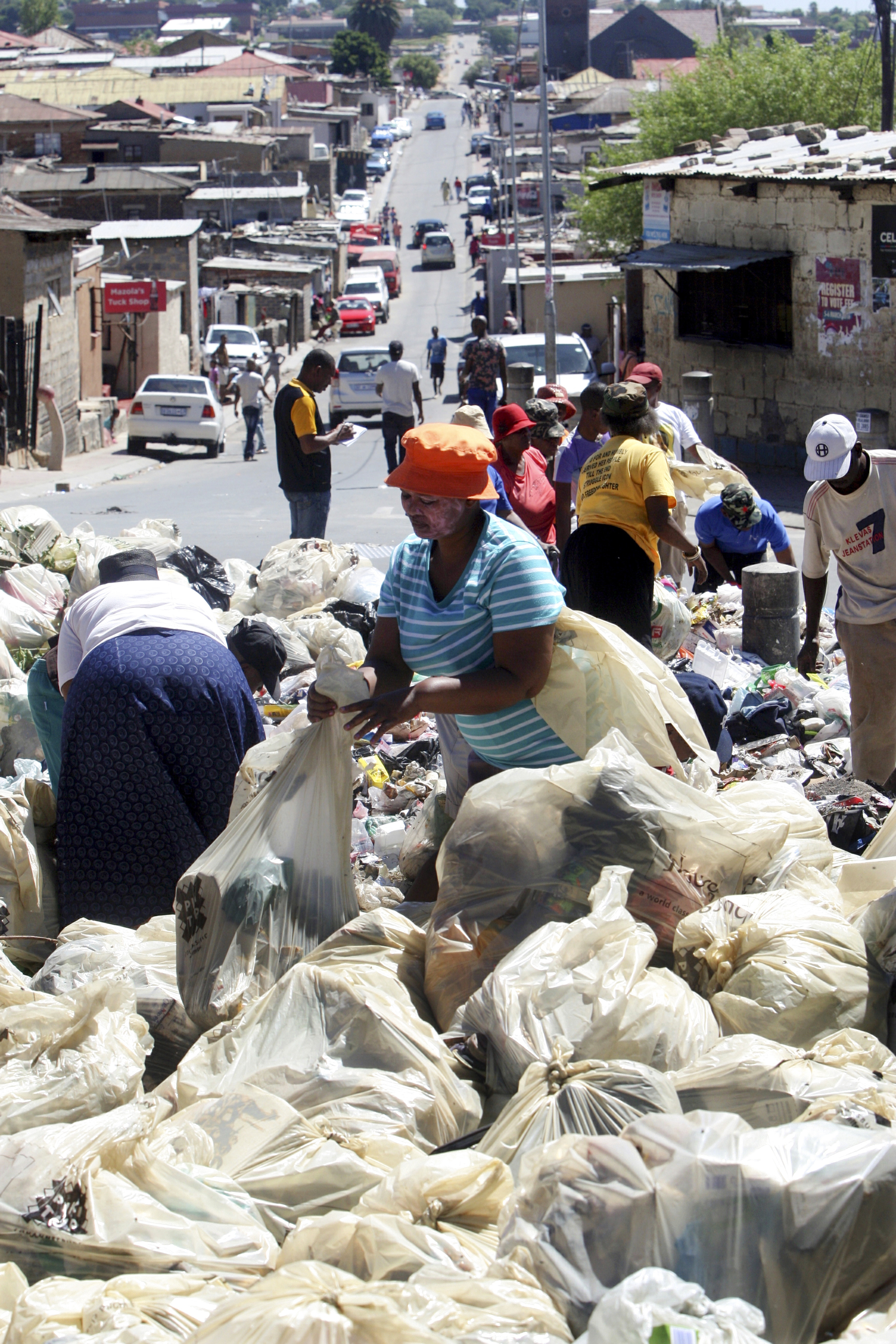
File Photo: Residents try to clear the garbage on the streets on March 28, 2016 in Johannesburg, South Africa. Three children were playing in a heap of rubbish when a gas lamp exploded, leaving them with serious wounds. (Photo by Gallo Images / Sowetan / Antonio Muchave)
With South Africa having the second-highest Gini coefficient in the world – meaning it is the second most economically unequal country in the world – it is not far-fetched to deduce that most of the food waste is coming from the middle classes and not the people who are struggling to put food on the table in the first place.
Joubert says: “Richer families have more money to spend on food, have better storage at home (fridges and freezers), they can benefit from the bulk-buy prices from supermarkets, and can haul all that food home in a private car. The result is that people often buy more than they need or can use.
“Poorer families buy more frugally. They have less money, poorer storage at home and will only buy what they can carry home on foot or by train or taxi, so there’s often less wastage. They only buy what they can eat immediately.”
Another reason the middle classes waste food, says Janusz Luterek, one of South Africa’s foremost legal experts in food law, is consumer uncertainty regarding the dates printed on packaged foods.
“It’s confusing, this whole thing with the best-before, sell-by and use-by dates printed on pre-packaged food,” he says. “And people prefer to err on the side of caution and throw away anything that’s past any of those dates.”
The only date consumers really need to worry about is the use-by date.
“The sell-by date is not important for the consumer at all. It’s something that the manufacturer chooses for themselves. The best-before date acts purely as an indication of when to eat food at its optimum best. The law says that food is still marketable after that date,” Luturek says.
“The only date consumers really need to consider is the use-by date. It is a date set by the manufacturers who believe that their food will no longer be safe to eat after that date.”
Luturek, who studied chemical engineering before he studied law, is familiar with the chemical processes relating to the breakdown of food and trusts his own knowledge and instincts on food storage and edibility implicitly.
“I would never, ever eat something after its use-by date, but the best-before date is not an issue for me at all, as long as I know I have transported and stored the food correctly.”
Reducing the amount of food a family wastes is a project that requires thought. Middle-class families, increasingly aware of the changes and instability being wrought by climate change, are starting to think through how they use things like plastic and how they work with the food they bring into their homes.
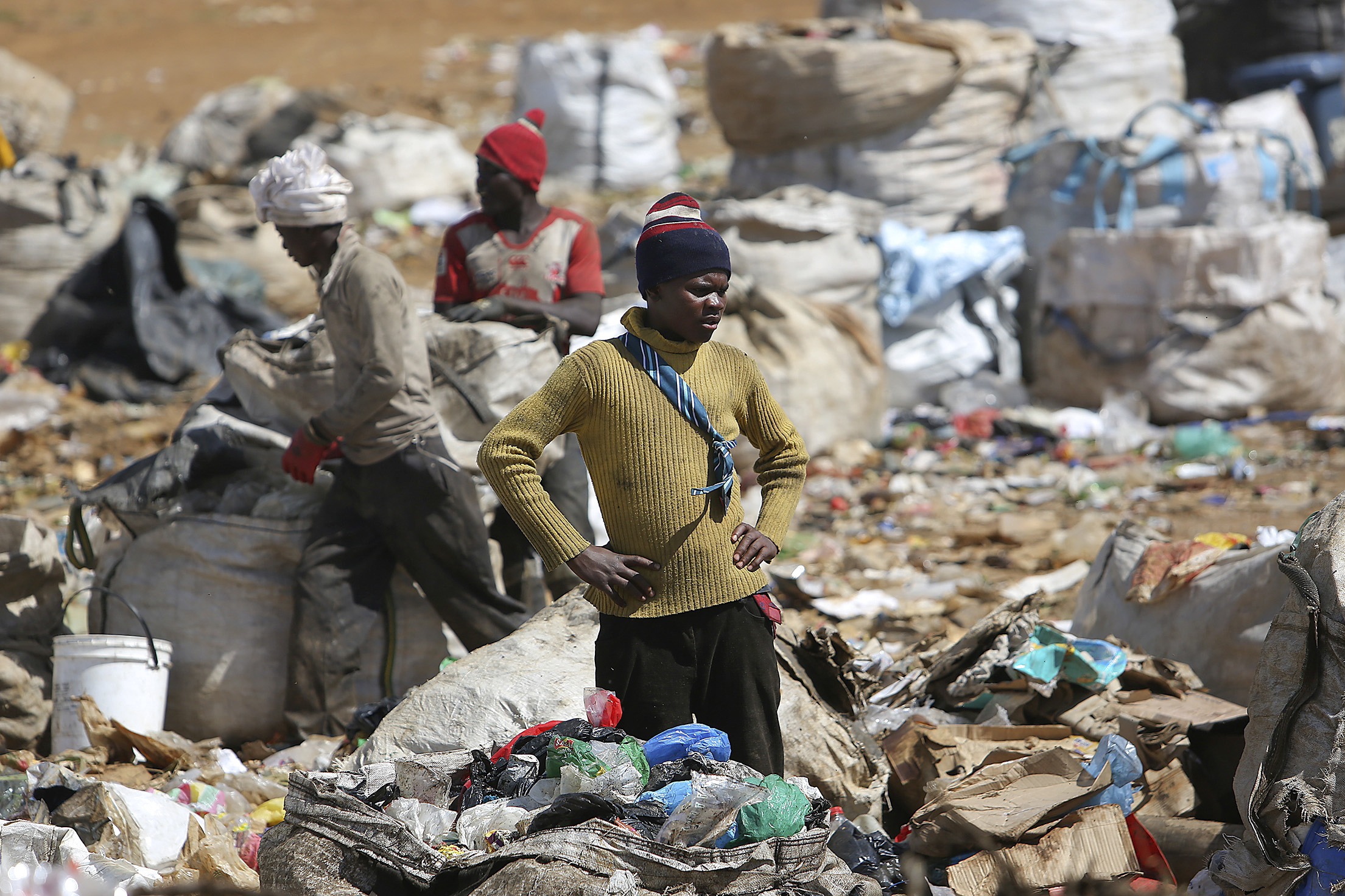
File Photo: People are seen picking waste at Rietfontein Landfill site. (Photo: Alon Skuy/Gallo Images/Sowetan)
However, Joubert says these small behavioural changes can be a bit of a red herring.
“Yes, there’s a cumulative effect if enough people buy and use food more mindfully, but what we need – and this applies to our entire economy – is a systems-level change to reduce waste and pollution.
“Wealthier families are politically and economically powerful within their communities and should leverage this to bring about change in the food system.”
She provides these pointers for using that power effectively so that less food is dumped and more of it reaches the many hungry people we brush past in our daily lives:
- Support civil society organisations or local initiatives that are testing models to rescue food and stop it from ending up in landfills.
- Support restaurants and retailers that do the same.
- When big food corporations don’t take responsibility for their waste, lobby them to do so. (One start might be to insist that South Africa’s major food retailers are more up-front about how they manage food waste in their stores on their websites. This information is almost impossible to find in a simple Google search.)
- Lobby for or support by-laws that tackle food waste issues.
- If expiring food coming either from bulk food retailing or from the home can’t be salvaged, it should be turned into compost and put back into the next generation of healthy calories. That means building bulk composting sites in and around cities, and ways to get that compost back to local food producers.
One of the conclusions of the SAJS article is that “initiatives focusing on urban households’ food waste reduction and diversion from landfill have the potential to divert significant amounts of food waste from landfill”.
Joubert says: “Cities are at the epicentre of the food waste questions because this is where half of the country’s citizens now live and where much food waste is generated. It means cities are where solutions need to be tried and applied.
“So if you’re a city-living wealthier family, your most potent power – apart from trying to not waste food at home – is to investigate the opportunities for getting involved in solutions in your area.” MC




















 Become an Insider
Become an Insider